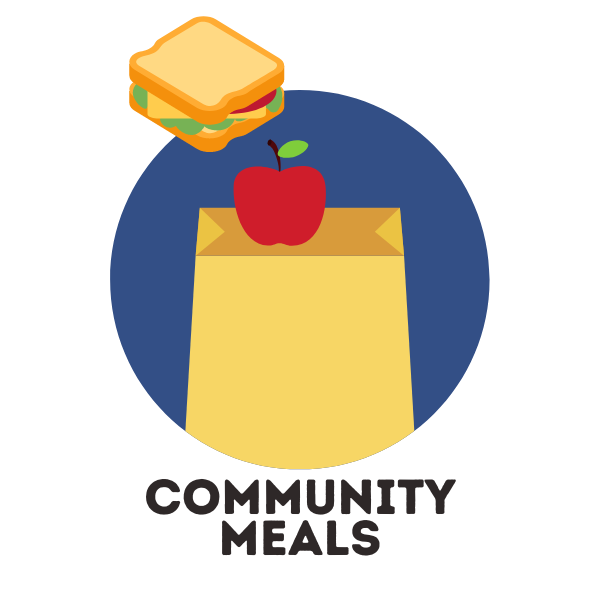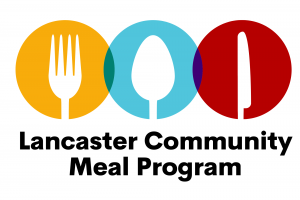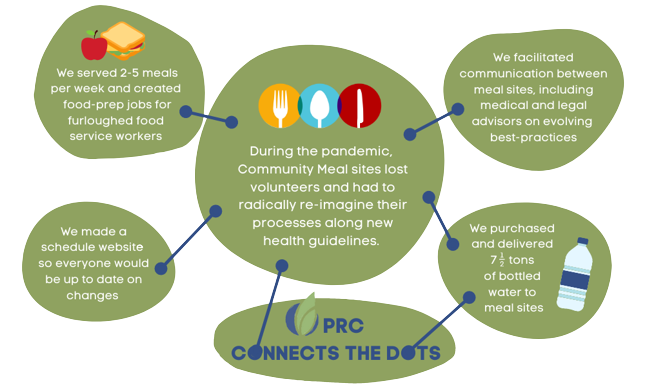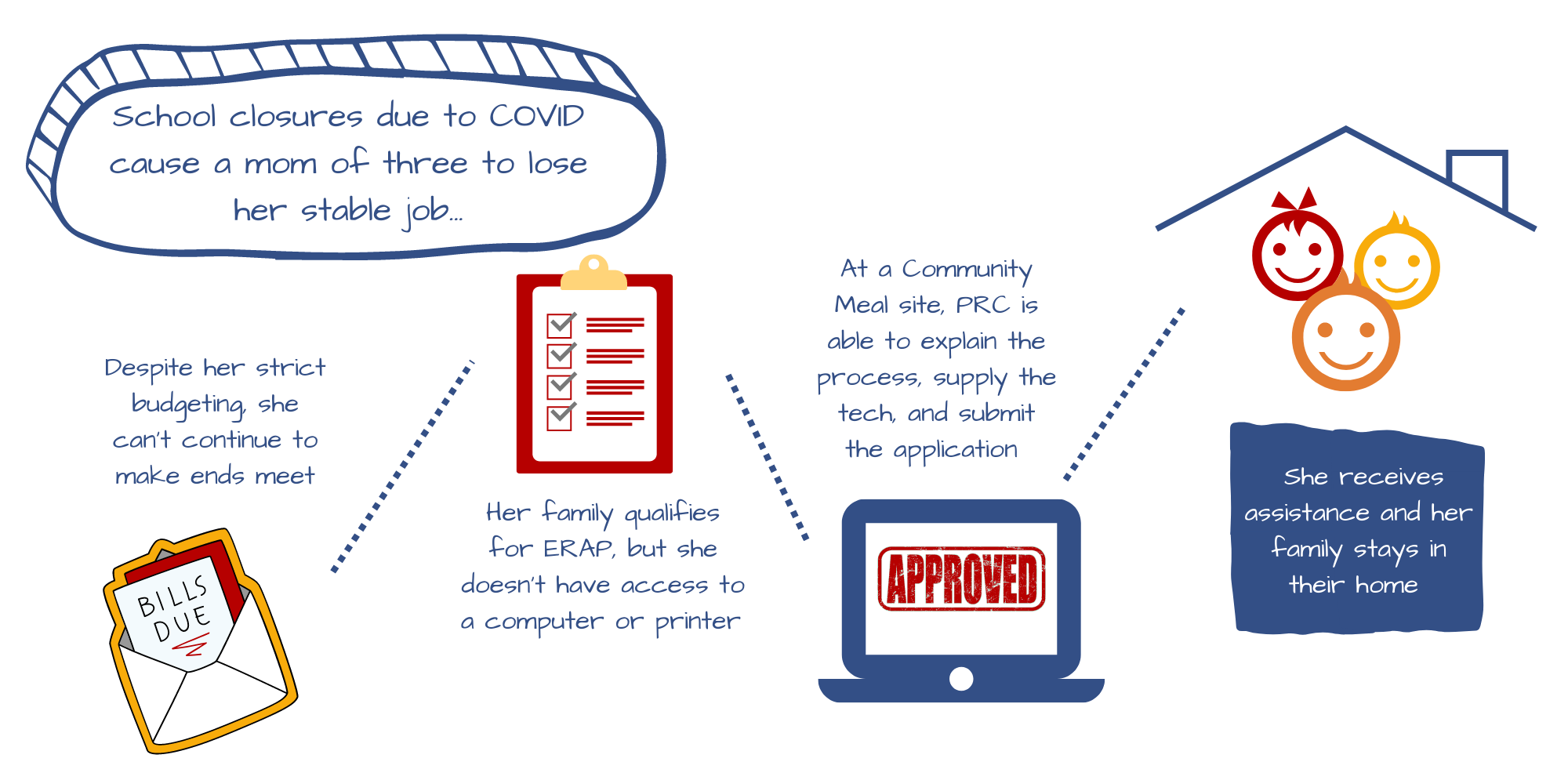Community Meals
 The Lancaster Community Meal Program is a network of churches and organizations that provides three free meals every day, seven days a week at locations across Lancaster. During the pandemic, gaps formed in the Community Meal schedule as some providers had to close. PRC stepped in to fill the gaps by recruiting new partners, providing food, and serving meals.
The Lancaster Community Meal Program is a network of churches and organizations that provides three free meals every day, seven days a week at locations across Lancaster. During the pandemic, gaps formed in the Community Meal schedule as some providers had to close. PRC stepped in to fill the gaps by recruiting new partners, providing food, and serving meals.
PRC served up to five meal sites per week, and currently serves two meals each week, while continuing to support others in the program. At PRC meal sites, we always offer choices. Choices give the guest dignity and allows each person to select items that they enjoy. It reduces food waste since each guest only takes items that they want and will use. This also allows us to cater to dietary restrictions due to religion, health, or other reasons, so no one goes hungry.
PRC maintains a website to ensure up-to-date information is always just a click away! Check what meals are available, download a schedule in English and Spanish, or see what changes are coming up at OurCommunityMeals.org.

At PRC meal sites, we always offer choices. Choices give the guest dignity and allows each person to select items that they enjoy. It reduces food waste since each guest only takes items that they want and will use. This also allows us to cater to dietary restrictions due to religion, health, or other reasons, so no one goes hungry.
Are you looking for this resource?
Check out the full schedule of meals in Lancaster City at OurCommunityMeals.org
Auxiliary Services at Community Meal Sites
For many Community Meal guests, limited access to transportation and technology can make it difficult to pursue goals surrounding health, housing, legal aid, and educational opportunities. To begin to meet some of these needs, PRC has coordinated with a number of community partners to bring essential services to Community Meal sites, where the people who need them most have already gathered.
Covid Vaccine
During the pandemic, PRC partnered with Union Community Care to offer COVID vaccine clinics and with Lancaster EMS and Penn Medicine to provide flu vaccines at Community Meal sites. Five PRC volunteers, all current or former medical professionals, acted as Vaccine Ambassadors, regularly attending meals to build relationships and encourage vaccination.
 One guest was hesitant to get the COVID vaccine because he was afraid to feel sick afterwards. In conversation, we discovered that he relied on the Community Meals for food, so if he felt too sick to walk to a meal, he would go hungry. PRC packed bags of food for clients, including soup, crackers, and applesauce so no one had to choose between getting the vaccine or eating.
One guest was hesitant to get the COVID vaccine because he was afraid to feel sick afterwards. In conversation, we discovered that he relied on the Community Meals for food, so if he felt too sick to walk to a meal, he would go hungry. PRC packed bags of food for clients, including soup, crackers, and applesauce so no one had to choose between getting the vaccine or eating.Emergency Rental Assistance Program (ERAP)
The Emergency Rental Assistance Program (ERAP) contained millions of dollars for COVID-related rental relief, but applicants had to have access to a computer, printer, and scanner to apply online. And many people had questions as they attempted to complete the application, but the official helpline was overwhelmed. PRC set up technology stations at Community Meal sites. Our volunteers and staff patiently walked dozens of clients through filling out their paperwork, what supporting documentation was needed, and submitting their application online. Thankfully, many of our clients finished their applications and received the assistance necessary to stay in their homes.

Other Food Services
Other food work has grown out of PRC’s connections and work in Community Meals.
Temporary Shelter Meals
During the Covid Pandemic, affordable housing and shelter space became extremely limited and the processes for receiving these services slowed down due to quarantining and social distancing. Due to these issues, Tenfold and LancCo MyHome opened temporary shelter spaces and many people experiencing homelessness were placed into temporary shelters within local hotels. These locations were typically located outside of the downtown area where the community meals take place. In order to provide food to these individuals, PRC sourced and delivered bagged meals to the temporary shelters with the help of volunteers and caseworkers. Food was sourced from Central PA Food Bank and Commons Company then packed and delivered twice per week by PRC volunteers.
Church Food Pantries
PRC has helped church food pantries connect into donated food network to reduce costs, overhaul physical locations to prioritize food safety, and implement best practices for their clients.